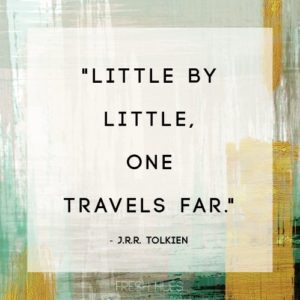As I approached the rock that loomed above me I smiled to myself, “It’s good to be back.” Railey Beach is a world class climbing destination in Thailand and can easily be recognized by the immense limestone outcroppings that dot along the coastline in perfect turquoise water. This distant paradise is one of my favorite places in the world and as I gear up with a group of fellow climbers I am thankful to have the opportunity to be here again. Climbing is a great sport physically, but what I really like is it teaches me mentally how to slow down and take smaller steps.
How to Slow Down
Climbing is a sport that I have been involved with for a long time. I tried climbing for the first time in college and have climbed on and off for the past seven years. One would think that after seven years I would have some sense of mastery with the sport; but instead, I am continually humbled by the fact that anytime I have some sense of confidence in my ability, I am flung to the ground. Climbing kicks my butt. I think it is for this reason that I am strangely compelled to continue on in my journey in attempt to face my fears, learn new skills, and ascend to new heights.
However, this is never my approach. Because I am an overachiever, I struggle with the learning process that is natural and try to skip past all of the essential stages of being a novice. I want to immediately be great at climbing. This is why, in my enthusiasm, I sauntered up to the Ao Nang Climbing company and explained that I wanted to book a trip with them. I was introduced to Gob, who would be the guide, and explained to him that I had been climbing for about seven years and have even taught climbing before.
I told him I’m living here because I want to get back into the sport and I haven’t been in quite some time, but maybe after I got back on track I could help them lead other climbers if they needed someone extra.
Reality Check
Out at the rock, I was suited up with shoes, a harness, and tied in easily into the familiar figure eight knot of the rope. Looking up, it was a difficult climb. I was wondering if maybe Gob had overestimated my ability because I would really liked to have started on something a bit simpler. “Belay on, Climbing” we exchanged and up I went.
About half way up I realized that this was not the appropriate climb for me to start on. While I have spent some time on real rock, the bulk of my experience has been in climbing gyms. There is quite a big difference between climbing inside where the holds stick out from a flat surface with neatly marked colored tape and outside where the holds could be anywhere, your grip is not guaranteed and you cannot see your feet. I reached for chalk.
Taking a breath, I regained my senses and pressed on. Finally, I reached the top and was on my way back down. I realized my guide kept yelling something at me and from the height and with the impeding language difference, it was difficult to understand. “CLIP the ROPE,” he was yelling. Oh, great, I cannot just drift merrily down the climb, I now have to clip all of the quickdraws that I followed getting up here. These are carabineers that hook into the bolts in the rock and guide the rope as the climber ascends. However, I have never actually had to re-hook myself upon descent and wasn’t sure I was up to the challenge. I was traversing unsteadily sideways reaching out for the carabineer when I lost my footing entirely and went swinging off of the rock. Caught by my belayer and looking down I impatiently yelled down, “I can’t do it!”
Unsatisfied with my response, I received several more calls to “CLIP the ROPE!” After four more attempts, he finally let me descend and I clipped the remaining two on the way down. I untied, shook out my hands and walked off of the rock.
Taking the Easy Route
For my second climb, I got on the one they had set up for first time climbers. Gob states, “You not do this one, its too easy for you.” I am not sure he quite understands that I can’t do the next one up and really could use a confidence booster at this point. I smile and say back, “Other one too hard, need to do this one.”
“Ok,” he replies and I tie in. Thank God I could get on and have a successful time of it. I felt a bit ill from the first experience and needed to regain some sense of my ability, and it worked. I was able to get on the harder climb next.
With some struggling and effort I made my way up my third climb. Learning the type of rock and textures is always an interesting part of climbing on different rock. Because you can climb a variety of rock (granite, volcanic, limestone, sandstone) it is important to learn the different features, textures, and footing that is required in each case. The same rock can have a variance and on this climb it went quickly from big pocket holds to sharp cutting pebbly holds. Making it past the crux, or the hardest part, I was able to ascend to the top. I reached and half jumped with the last bit of effort I had to touch the ring at the top and looked down signaling that I wanted to be lowered.
Touch The Ring
Gob shouts back, “Touch the RING!”
Oh my God, didn’t he see me? “I DID TOUCH THE RING,” I yelled.
It was like something from Lord of the Rings, ‘Touch the Ring’,’ Don’t Touch The Ring’ – but he wasn’t understanding me ad I was getting very tired of hovering in the air uncomfortably dangling from 50 feet up and Froto was nowhere to be seen. Finally, he allowed me to come down and as I’m on the ground untying my rope, I’m catching disapproving looks. I try to state my case. “I touched at the top, did you not see me?”
Unimpressed, and shaking his head no, he answers, “you not beginner, you can touch ring.”
Oh my God. I then go on to try to explain to him that I’ve actually been injured and am coming back from not climbing, and yes, I did touch the ring. I opt to go to another climb and get belayed from someone a little less relentless. As I watch the other climbers go up and down the routes I’m struck by a feeling I’ve had often when I have climbed.
Pushing Yourself Too Far
I don’t know if it is just the nature of the sport or the people that are attracted to it, but there is always this unnatural urge to push oneself faster and harder than humanly possible. I really have had to work on this nature of the sport because it is so insatiable– just one more hold, one more throw, one more… and then the next thing you know, you have just one more injury. It is really easy to overextend yourself and have pulled tendons, cracked ribs, and broken limbs. I glance over at Gob, and probably picking up on my insecurities, he says, “Sorry, I didn’t see you touch the ring.”
I nod, “Mai pen rai,” it doesn’t matter. It shouldn’t matter. But somehow it does. I go into my next climb a bit thrown and can’t get up an easy crack problem and decide to come down.
Later, in my room, I sat trying to decipher this feeling that I was carrying around. I’ve had it before and thankfully I have the time here in Thailand to look at my feelings and actions. I have a mix of feelings spinning around ranging from the fact that it is hard for me to just be a participant on trips (I used to lead them) and that I didn’t feel acknowledged by my efforts. Everyone else was getting handshakes, high-fives, and approving words after each climb. I felt like I had let someone down. And somehow, that said, I felt like I had let myself down. But there was no reason to feel that way! I had a wonderful day climbing in my favorite place in the whole world, and then, suddenly it struck me.
Setting Realistic Expectations
I had set the whole thing up. I had started with an inflated ability to assume that I would be good at something I had never tried. Yes, I had been climbing, but not in a long time, and not on this particular rock. I assumed the role of trying to be a super-hero rather than a novice or amateur thereby creating unrealistic expectations from my guide, and for myself.
Because I wanted to be good at it, I pumped myself up by sharing my enthusiasm (or goals) with others. This backfired and made me feel performance anxiety and left me wondering, “What if I can’t do this?” In my first attempt, I went Too Big and Too Fast, trying to skip steps and force myself to push through a learning curve.
Exhausted, I realized on my second climb I needed to wind back because I was overwhelmed. I was left feeling worried and doubtful. Regaining confidence for my third climb, I was able to go Too Big and Too Fast again, having similar results. By the last climb my head was so distraught with emotions and feeling misunderstood and unsupported, I had completely lost all focus and could not even finish an easy climb. Of course, no one wanted to help me because I had come across as someone who already had it worked out, or could handle it. This was the defeat.
The defeat in the process, or cycle, that I have put myself in has not just happened in climbing. My initial excitement for wanting to become involved and lead, judging myself against super-hero standards, setting unrealistic expectations and subsequently going into periods of fatigue or burnout have all been a part of my overachiever cycle. While my intent is good, the result is that I work twice as hard and feel emotionally spent when I could have saved myself some time and effort.

Saving Yourself From Yourself
While I could have just chalked up this whole experience as something of a fluke, Gob played a perfect role in the perfect lesson I needed to learn. Sometimes we need to recognize our own behaviors so we can get out of our own way. Being a novice, taking things slow, and getting help from others are all very difficult for the single-minded, focused, independent business owners. In my experience (being one, and working with) I have found that most business owners are overachievers. While this drive and super-hero mentality has propelled us into being business owners, we also need to realize when we are setting ourselves up for emotional and productivity roller-coasters.
Here are some tips that I put together after my humbling experience of learning from the rock:
- Triple the amount of time you think it will take you to do something. This includes learning a new task, a new skill, training someone, implementing a new project, et cetera.
- Let yourself be a novice. Approach new activities from that angle and allow yourself to be vulnerable and in need of help.
- Talking yourself into doing something by sharing your goals or knowledge can be interpreted by others that you are the expert. People are less likely to help you if they think you know more about something than them. Instead, allow yourself to experience the learning curve with others.
- Setting yourself up with unrealistic expectations brings out the judge in others and in yourself. Try setting smaller goals instead and approaching others to help you along the way. Achieving smaller goals will further your success and improve your confidence.
- Learn that by slowing down, you are actually speeding up your progress. I took the climbs in this order: 2, 1, 4, 3. Had I just gone through 1, 2, 3, 4 I would have finished, felt better, and probably attempted a fifth climb. I also would have had an entirely different experience emotionally which is what is really important in retaining our focus and energy.
- Know when to follow. Being Gung-Ho is commendable, as is wanting to be a leader. But, the truth is we don’t need to push our way to the front of the pack. By learning to follow, we learn how to lead. Let yourself be last, be a learner, and be slow.
- Trying to push through life simply doesn’t feel very good. It is like driving as fast as you can to hurry up and get home to relax. By the time you get home, you are a stress case and you feel awful- it simply doesn’t work. When you find yourself trying too hard, or fighting the forces of nature (or gravity) remember one thing: it’s ok to let go and come down. You’ve already touched the ring.
It is said in Thailand that “Climbing gives you Power” my hope is that this article will have the same affect on you.


